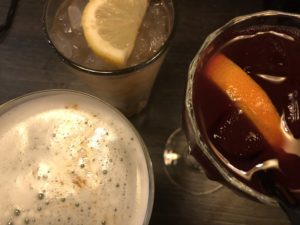
Can your beverage creating hobby lead to a beverage manufacturing business?
Most beverage manufacturers got their start at home–in the kitchen, the spare room, or the garage. They start as home brewers, as home wine makers, or as cocktail mixers. They make a great product, they get great feedback from their friends and family, and they begin to think: “Can I make a business out of this?”
Here are 5 common questions we are asked by beverage creators.
Question 1: Can I sell my homemade beer, wine, or liquor-based beverage out of my house or at farmers’ markets?
No, it is a violation of federal law and the Florida Statutes to sell any alcoholic beverage that is not made by a licensed manufacturer at a licensed facility.
The primary reason for this is taxes. Both the federal government and the State of Florida impose excise taxes on the manufacturing of beer, wine (which includes cider and mead for licensing purposes), and distilled spirits. The government agencies that handle collecting these excise taxes use the licensing process to confirm that beverage manufacturers calculate the taxes owed accurately and pay them on time.
Question 2: Can I get licenses to make alcoholic beverages at my home?
No, federal law and the Florida Statutes prohibit beverage manufacturing licenses for any space within or attached to a residence, but there are some exceptions.
It may be possible to get beverage manufacturing licenses to use a shed or unattached building on residential property. However, its often the case the local zoning ordinances also prohibit the use of residential property for a commercial manufacturing business.
Commercial space that is part of a mixed-use property–such as an apartment building or residential condominium building–may be approved for beverage manufacturing licenses.
Question 3: Can I bottle and sell blended alcoholic beverages made from ingredients purchased from a store?
No, alcoholic beverage products purchased from a retail vendor cannot be incorporated into blended products that are re-bottled and sold. Blended beverage products–including cocktails, punches, liqueurs, lemoncello, sangria, and shandies–cannot be packaged and sold using store-bought alcohol.
Even licensed manufacturers are prohibited from incorporating store-bought alcohol into their products. In Florida, licensed breweries and wineries must purchase third-party produced beer and wine, respectively, in bulk from a licensed distributor or Broker-Sales Agent. Florida distilleries may purchase distilled spirits in bulk directly from other licensed distilleries.
Question 4: If I contract to have my beer, wine, or liquor product made by a licensed manufacturer, can I protect my brand and recipes?
Yes, contracting to have your product made by a licensed manufacturer doesn’t mean that you relinquish all rights that you have in the brand and the recipes. Those are your intellectual properties, even if you don’t have the federal and state licenses to manufacture products yourself.
It’s up to you to protect your intellectual property, including brand names and recipes. Most importantly, you should have a written contract with the manufacturer that clearly states that you own the intellectual property and the manufacturer is making the products under license from you. Your contract should also give you a clear means of terminating the contract, taking back the brand names and recipes, and holding the manufacturer legally responsible if it violates your rights. We can help you with this.
Question 5: If I get the right licenses, can I sell my alcoholic products directly to restaurants and bars?
No, generally alcoholic beverage manufacturers in Florida are prohibited from selling their products to vendors, including restaurants and bars. This is a product of Florida’s Three Tier System, which are a set of statutes designed to keep manufacturers, distributors, and vendors separate. Under the Three Tier System, manufacturers must only sell alcoholic beverage products to licensed distributors, and vendors are required to buy alcoholic beverage products only from licensed distributors.
There are some exceptions to the Three Tier System. Florida breweries and wineries are permitted to have licensed taprooms and tasting rooms, where they can sell their products directly. Florida craft distilleries are permitted to have gift shops, where they can sell a limited number of bottles of distilled spirits to individual purchasers. However, under the Florida law existing in 2019, there is no legal means by which a licensed manufacturer can sell alcoholic beverage products to an unrelated retail vendor, except by going through a licensed distributor.
Do you have additional questions about turning your beverage creating hobby into a beverage manufacturing business? We would love to speak to you about your plans. Contact us now to schedule a consultation.
Because we’re attorneys: This information is provided on an “as is” and “as available” basis as of the first date of posting. We disclaim any duty to update or correct any information contained in this information, including errors, even if we are notified about them. To the fullest extent permitted by law, we disclaim all representations or warranties of any kind, express or implied with respect to the information contained in this information , including, but not limited to, warranties of merchantability, fitness for a particular purpose, title, non-infringement, accuracy, completeness, and timeliness. We will not be liable for damages of any kind arising from or in connection with your use of or reliance on this information, including, but not limited to, direct, indirect, incidental, consequential, and punitive damages. You agree to use this information at your own risk. Regarding your particular circumstances, we recommend that you consult your own legal counsel–hopefully BrewerLong.
